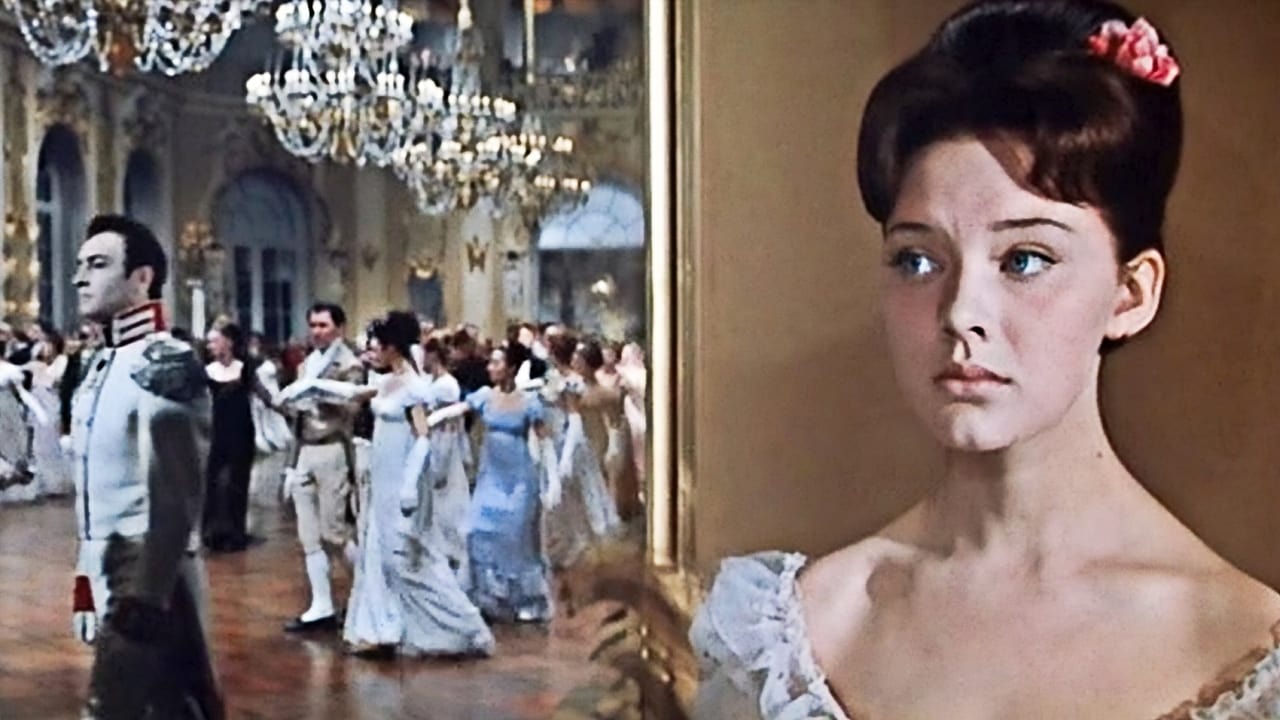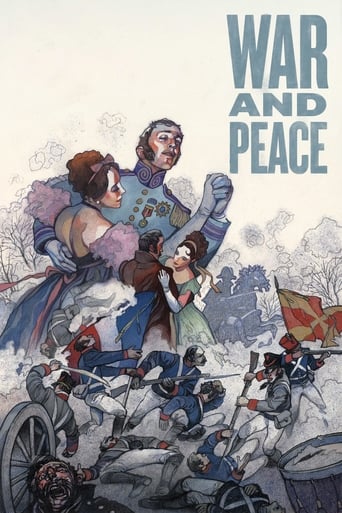

What makes it different from others?
... View MoreVery well executed
... View MorePlot so thin, it passes unnoticed.
... View MoreThe movie's neither hopeful in contrived ways, nor hopeless in different contrived ways. Somehow it manages to be wonderful
... View MoreThis could be the ultimate epic film: an overwhelming sequence of extraordinary visual set-pieces on the grandest possible scale. Director Sergei Bondarchuk seizes every opportunity to deliver gargantuan spectacle with all the manpower and resources at the command of the Soviet state. His filming of the Battle of Austerlitz, the Battle of Borodino, the burning of Moscow, and the retreat from Moscow is patently a determined quest for the visually superlative, and it is a successful one. Even the depiction of such lesser events as a court ball and a wolf-hunt is lavish to an astonishing degree.In the face of all this phenomenal effort, expense, and ingenuity, it seems downright ungrateful to say that my appetite for such brilliant grandeur was well and truly sated long before the end of the film. I started to notice that the acting and the music are sometimes rather less than superlative. More seriously, I felt the lack of narrative drive. Bondarchuk appears much more interested in the fate of armies and nations than in the fate of individuals. The great spectacles are what matter to him, and the human stories of "War and Peace" are merely fitted into the interstices. One never gets close enough to the characters. There is a lack of concern for story-telling, perhaps because this is an adaptation made by Russians for Russians, i.e., by and for people who already know the novel very well. Would anyone who has not read the book really be able to follow the film? I am doubtful. On the other hand, viewers who have read it are likely to miss access to the inner life of the characters. Of course, this is one of the unavoidable difficulties of filming any novel. Suffice it to say that Bondarchuk displays no particular skill in getting round it. Repeated use of short voice-overs to convey unspoken thoughts is not altogether effective. On a more technical note, the sound-recording fails to create a sense of intimacy. Often, regardless of whether the actor is seen to be near or far, the volume of his voice is just the same.The central character of Pierre Bezukhov seems to me miscast. (The director, I learn, chose himself to play the role.) Unless I am remembering the novel wrongly, this Bezukhov appears too prim, too secretive, too calculating, and plainly too old. He frequently comes across as a disapproving bourgeois in the midst of aristocratic excess.The problems of the viewer in following the narrative are increased by the casting-director's rather limited notions of what constitutes good looks. Among the men, Prince Andrei Bolkonsky, Dolokhov, Kuraghin, and Prince Bagration are all of broadly the same physical type. The same may be said of the young women, Natasha, Soniya, and Mariya (not that the latter two receive much attention). As usual in historical films, some of the women have hair-styles and make-up more suggestive of the time in which the film was made and than the time in which it is set. Anachronistic music within the film is also occasionally distracting.This massive patriotic prestige project is worth seeing. The battle-scenes are absolutely outstanding. Its ostentation, however, means that the personal stories of Bezukhov, the Bolkonskys, and the Rostovs are by no means as absorbing and affecting as they ought to be.
... View MoreThis is one real grand old fashioned epic movie, in basically every way imaginable. But how many people have actually ever heard or watched this movie? Surprisingly not nearly as much as it's deserving. It of course also has to do with the fact that this movie was made at the time of the cold war, so this movie wasn't largely viewed or available in the West. And of course its extreme long running time is also an element that prevents lots of people from watching this.Yes, you can view the movie in parts, since each part of the movie forms a new different 'chapter' (Chapter I: Andrey Bolkonskiy, chapter II: Natasha Rostova, chapter III: 1812 god, chapter IV: Pierre Bezukhov) of the story, focusing on another character, in either war or peace but its of course best and most effective to watch this movie as one whole. After all the chapters and characters are of course all connected. There are a couple of characters that appear- and connect the 4 stories. The chapter themselves also aren't at all times chronological with each other and its rather 4 different tellings and different point-of-views, each of them providing more in depth of the story and characters. Each chapter has of course its own qualities and some are more appealing than others for certain people. And even though the movie its running time is over 7 hours, it still is a movie that moves along just fine. Despite not having the most fast pace, it never drags.It's especially the contrast between the war and peace situations that makes the movie so epic and powerful in what it tries to achieve. Each chapter focuses on a different either war or peace situation. I think Tolstoy himself would had been pleased with this adaption of his novel.It's probably one of the, if not the, most expensive movie ever made but that's hard to really say because of the inflation. So it can't be really said how much this movie cost to make with today's money. The movie not in the least also was so expensive because it took years to make it. It was good to see that they didn't just only put all in the money in the battle sequences of the movie but also obviously in the overall look of the movie. The movie features some amazing large detailed sets and good, detailed, authentic looking costumes. But it of course are still the battle sequences that will impress the most. It will blow your mind. Ten-thousands of extra's were used during the big battle sequences. I keep saying this but it's always more impressive to see an extreme number of real humans charging than it is to watch a grand CGI-battle, no matter how realistic and impressive it all looks.What I also liked during the battles was that it in parts used the same style as '20's and '30's Russian genre movies, in its camera-work and style of editing mostly. No doubt an homage to the good old golden days of Russian cinema. But the movie overall also uses a great and unique unusual style at times. It uses lots of tricks in parts, such as split-screens and extreme fast editing, to often give the movie an unique and sort of surreal feeling. The movie would often also feature some extreme long shots, in which the camera moves all the way through the ballrooms or other rooms in the palaces or over the battlefield.The acting in the movie is also surprisingly great, as far as I'm able to judge that. I mean it's also hard to really judge the acting quality in a movie in a language that you don't speak or understand for yourself. Seemed to me that most of the actors in this movie are normally stage actors, which was a good and suiting acting style for this, of course sort of overblown, movie. The movie of course features a whole lot of characters but they all get the right required treatment and are deepened out. The long running time of course allowed this all to be possible. No way this movie would had worked out as good as it was just 'merely' a 3 hour epic.I think the fact that the movie won an Oscar for best foreign film, despite of the cold war at the time, shows how brilliant the movie is.10/10http://bobafett1138.blogspot.com/
... View MoreI'm probably not giving this movie a fair shake, as I was unable to watch all of it. Perhaps if I'd seen it in a theater, in its original presentation, I might have appreciated it, but it's far too slow-moving for me.I read the book some 25 years ago and the details of the plot have faded from memory. This did not help the film, as it's something less than vivid and clear in its presentation of events.This is really four linked films, or a film in four parts, and was, I believe, intended to be seen over four nights in a theatrical presentation. I found Part I to be enjoyable enough, but it was all I could do to sit through Part II, which drags interminably. Reading Tolstoy's philosophizing is one thing. If you get a good translation or can read it in the original, his brilliant writing far outweighs any issues one might have with the pace of the story. On film, however, it's hard to reproduce without being ponderous.I have other issues with the parts of the film that I saw. It's very splashy, with a lot of hey-ma-look-at-this camera work that calls attention to itself, instead of serving to advance the story.Clearly, I'm missing something, but I just couldn't summon the enthusiasm to crank up parts III and IV.
... View MoreI have only seen this film in the widely condemned Kultur pan-and-scan version with English subtitles, so I have not experienced it in its full wide-screen glory. But what I saw was a travesty of the novel. The novel combines a savagely satirical comedy of manners with an unsparing quest for moral truth. Bondarchuk and co. have reduced it to a Hollywood-style love story, essentially no different from the US version.The characters of Nikolai Rostov and Marya Bolkonskaya are reduced to bit parts, and Nikolai's relationship with Sonya vanishes. Crucial scenes are left out: e.g., Prince Andrei's visit to his father's abandoned estate and the entire narrative epilogue. So much for the film's vaunted faithfulness to the text. It is like a parrot reciting Shakespeare, only not funny.I suppose the tip-off is Bondarchuk's ludicrous casting of himself as Pierre. He was twice as old as the character, and it shows. Tikhonov as Prince Andrei looks the part. Savelyeva gives us Natasha's ugly-pretty aspect and ebullience, but the character's charisma did not come through to me. The girl is supposed to be jailbait, for heaven's sake.The film is a Soviet hack-job. If you enjoyed the novel, don't waste your time and money on this.
... View More